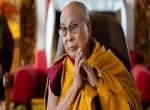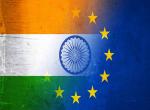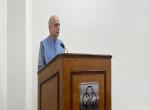Introduction
In February this year, PM Sheikh Hasina undertook her first overseas official visit to Munich, after her re-election for the fourth consecutive time, to attend the Munich Security Conference (MSC) which was held from February 16 to 18, 2024 in Munich, Germany. MSC is regarded as the world's leading platform for debates on international security policy, [1] bringing together security experts, politicians, military leaders, and the defence industry from across the world. [2] Therefore, PM Hasina’s participation at this event was significant as Bangladesh’s 12th parliamentary election which took place on 7 January this year received mixed reactions from across the globe.
Western countries including the UK, US, Canada and even the EU were critical of the election, raising concerns about the deteriorating political landscape of the country. For instance, the western media continuously reported on the government’s crackdown on opposition, human rights violations and the democratic backsliding in the state by describing her as a ‘strongman,’[3] an ‘iron lady’[4] and an ‘autocratic’[5] leader.[6] They even insisted that the poll was not free and fair by referring the election as ‘phony’ and the Election Day as ‘a bad day for democracy.’[7] Moreover, the USA had put several restrictions on Bangladesh from the pre-election period. On 22 September, 2023 US Department of State in a press release announced imposing of visa restrictions on Bangladeshi individuals responsible for, or complicit in, undermining the democratic election process in Bangladesh.”[8] However, the scenario seems to have changed considerably since then and Bangladesh under the Sheikh Hasina government at present has been successful in reshaping the country’s image in front of the international community through her effective skill of diplomacy.[9] In this backdrop, this article attempts to analyze the apparent shifts in relations between Bangladesh and the West after the controversial parliamentary election.
An Overview of Bangladesh’s 12th Parliamentary Election: Reactions from the West
On 7 January, Bangladesh held its 12th parliamentary elections which was boycotted by Bangladesh Nationalist Party (BNP) led opposition, allowing Awami League (AL) to win the election with very little opposition. The incumbent Prime Minister Sheikh Hasina has secured her fifth term in office, thereby becoming the world's longest-serving female head of state, with her Party winning an absolute majority in the polls. The election saw a considerably low voter turnout of around 41.8% as mentioned by the Chief Election Commissioner of Bangladesh. However, the critics argue that the number is much lesser than the mentioned figure. The AL won 223 seats out of 299 in the national election, with independent candidates winning 62 seats. Jatiya Party, which is a part of Awami League led 14 party alliance, won 11 seats; while Jatiya Samajtantrik Dal, Bangladesh Workers Party, and Bangladesh Kalyan Party won one seat each.
Soon after the declaration of the result, a U.S. State Department official stated that the election was not free or fair and there were reports of irregularities on the Election Day.[10] U.K.'s Foreign Office also expressed concern about the arrests and condemned "the acts of intimidation and violence that took place prior to and during the election campaign period."[11] Similar statements came from the EU, Human Rights Watch, etc. The U.N. also condemned the violence and repression during the elections in Bangladesh, urging the country to strengthen democracy.[12] However, on 18 January, the UN Secretary-General congratulated Sheikh Hasina on her re-election as the Prime Minister.[13] The previous day, on 17th January US,[14] and EU ambassadors to Bangladesh also met the new Foreign Minister of the country and emphasized on working closely with the latter in the coming months on issues of mutual importance/concerns. [15] Finally, despite his administration's previously critical stance on Bangladesh's democracy and human rights records, on 6 February, US President Joe Biden sent a letter to PM Hasina expressing his willingness to work closely with Bangladesh on a shared vision embarking a ‘new chapter’/ ‘new phase’ in US-Bangladesh relations. [16] In the same month, a senior-level US government delegation led by special assistant to the president and Senior Director of South Asia Affairs of the National Security Council Rear Admiral Eileen Laubacher, also included Assistant Administrator at USAID Bureau for Asia Michael Schiffer and US Assistant Secretary of State for South and Central Asia Afreen Akhter visited Bangladesh. [17] All these demonstrate the growing importance of Bangladesh in the US’s strategic orbit.
Shifting Tides: The Evolving Dynamics of US-Bangladesh Relations
It is important to mention here that in the year 2023, Bangladesh published its inaugural Indo-Pacific Outlook (IPO), as a part of the country’s deft diplomacy, to cope with the changing geo-political situation and “envisioned a free, open, peaceful, secure, and inclusive Indo-Pacific for the shared prosperity for all.” [18] The aim was to achieve the country’s national goal of Vision 2030 and Vision 2041 by enhancing economic cooperation with all the major powers both bi-laterally and through various initiatives such as being a part of BRI and Indo-Pacific Initiatives etc. The US stated that there is a ‘significant overlap’ between Bangladesh’s Indo-Pacific Outlook and its own Indo-Pacific Strategy, “including on issues such as freedom of navigation and overflight; open, transparent, and rules-based multilateral systems; and environmental resilience.” [19] Without directly mentioning QUAD, Bangladesh’s IPO included various provisions of the grouping showing Dhaka’s willingness to deepen existing cooperation with the bloc by maintaining strategic autonomy. [20] This has probably encouraged US and other western powers to strengthen its ties with the Sheikh Hasina regime at the current juncture. Moreover, in recent years, Bangladesh has been mentioned in multiple Indo-Pacific strategy documents published by the Pentagon[21] and State Department,[22] with emphasis on potential for “cooperation on counterterrorism, counter piracy, counter narcotics, and maritime issues.” [23] In the evolving Indo-Pacific landscape, Bangladesh’s strategic location at the Bay of Bengal region—connecting South and South-East Asia, China's deepening influence in the Indian Ocean Region, its close ties with Dhaka including its backing for Bangladesh's first submarine base and Moscow’s growing bonhomie with the Sheikh Hasina regime have made Bangladesh's strategic significance come to the forefront for Washington. [24] It is reported that Prime Minister Sheikh Hasina has recently requested Russia's state-run atomic agency Rosatom to consider building a second nuclear power plant in Rooppur. [25] All these new developments have probably encouraged US to change its tone while dealing with this geo-strategically significant South Asian nation.
However, it is equally important to mention that despite making several allegations against the Hasina regime, US, in reality, has strengthened its relations with Bangladesh in the recent years. US is the largest source of Foreign Direct Investment in Bangladesh[26] and has been the top export destination for Bangladeshi products for a long time. [27] It is reported that Bangladesh’s garment shipments to the USA, the single largest export destination of Bangladesh, almost doubled in the last five years. [28] But democracy and human rights issues have hindered the relations especially in the pre-election period.
According to Washington-based South Asia expert Michael Kugelman, a striking change can be witnessed in the attitude of US vis-à-vis Bangladesh after the January 7 elections. [29] He further stated, “It appears that both Dhaka and Washington have decided to bury the hatchet after the election-related tensions and aim for a reset in relations. The catchphrases of the moment are ‘next phase’ and ‘new chapter.’ A lot of conciliatory and warm language, and no public criticism. The bilateral mood has gone from a bitter feud to a love fest.” [30]
Navigating Bangladesh’s Engagements with the Global North at Munich Security Conference
Under this backdrop, Hasina’s maiden visit to Munich, after her re-election, provided an opportunity for Bangladesh to further engage and deepen its relations with the western world. [31] For instance, to name a few, PM Hasina held meetings with German Chancellor Olaf Scholz, Dutch Prime Minister Mark Rutte, Danish Prime Minister Mette Frederiksen, and Ukrainian President Volodymyr Zelensky (the so-called icon of democracy and the West’s war against authoritarianism following the Russian invasion of Ukraine[32]) on the sidelines of the conference. Moreover, on 17 February 2024, the British Secretary of State for Foreign, Commonwealth and Development Affairs Rt Hon Lord Cameron paid a courtesy call to the Bangladeshi Prime Minister, congratulating the latter on her re-election. [33] In the conference Sheikh Hasina participated in a panel discussion titled ‘From pocket to planet: Scaling up climate finance’ where one of her co-panelist was U.S. Special Presidential Envoy for Climate John Kerry, who is a former U.S. Secretary of State. [34] In her presentation, she highlighted Bangladesh’s role in addressing pressing global changes including climate change, terrorism and displayed her country as a promoter of global peace and security. Later, while addressing a reception hosted by Bangladeshi expatriates residing in Germany in honour of the visiting Prime Minister Sheikh Hasina, the new Foreign Minister of Bangladesh Dr. Hasan Mahmud said that a good election was held in Bangladesh by overcoming domestic and foreign conspiracies. [35] He further mentioned that more than 70 countries, including India, the United Kingdom, the United States, the European Union, and the United Nations as well as other international organizations have so far congratulated Prime Minister Sheikh Hasina. [36] It seems the PM has effectively deployed Bangladesh’s foreign policy provision of “Friendship to all, malice towards none” to develop a pragmatic approach towards other countries, forging friendship across international spectrum.
Sheikh Hasina’s Economic Diplomacy: Building Partnership with the Western World
After returning from Munich, in a Press briefing the PM mentioned that ‘Global leaders raised no question about the polls.’ [37] This reflects how the policies of the western countries are changing vis-à-vis Bangladesh in the recent months. No doubt, the Bangladeshi leader has become somewhat successful in changing the perceptions of the west with her effective skill of diplomacy. In addition, along with the country’s geo-strategic location and the present global geopolitical context; Sheikh Hasina has leveraged the country’s growing economic strength to attract the western countries, depicting Bangladesh as an important player in the global economy. [38] However, according to World Bank, Bangladesh's economy is projected to grow at less than 6 percent for the next three consecutive years, including the current fiscal year, which is definitely slower than the average expansion recorded in the pre-pandemic decade. [39] But still Bangladesh’s economy showed resilience amid global uncertainty – be it the Covid-19 pandemic or the Russia-Ukraine war. [40] Moreover, with the rise in Bangladesh’s purchasing power capacity, the country is increasingly becoming an attractive market for the western countries. [41] Therefore, even few months prior to Bangladesh’s Parliamentary election, French President Emmanuel Macron signed a $3 billion [42] deal for French aviation giant Airbus with Bangladesh. [43] Thus, economic diplomacy is often termed as the reason behind this South Asian leader’s success and her nations growing influence at the international stage.
Conclusion
To conclude, with her participation at the Munich Security Conference after her re-election, the PM has successfully bolstered Bangladesh’s standing in front of the international community— underscoring the country’s commitment to global peace, security and international cooperation. This visit was a crucial one for Sheikh Hasina and her government as the government of the world’s longest serving female head of state gained global recognition at a leading international forum. Moreover, through her effective skill of diplomacy, she successfully managed to gain legitimacy for her government and portray Bangladesh—the South Asian nation with a total landmass of 1,47,570 square kilometers (56,977 Sq. miles) as one of the important and responsible players in the global political arena.
Endnotes
[1] https://mfa.gov.by/en/mulateral/global_issues/munich_security_conference/
[2] https://www.dw.com/en/munich-security-conference/t-18236595
[3] https://www.taylorfrancis.com/chapters/oa-edit/10.4324/9781003042211-26/sheikh-hasina-bangladesh-arild-engelsen-ruud
[4] https://www.economist.com/asia/2023/05/24/sheikh-hasina-is-asias-iron-lady
[5] https://www.spectator.com.au/2024/01/how-sheikh-hasina-is-turning-bangladesh-autocratic/
[6] https://thediplomat.com/2024/02/bangladeshi-pm-sheikh-hasina-goes-for-an-image-makeover-abroad/
[7] https://www.theguardian.com/commentisfree/2024/jan/09/the-guardian-view-on-bangladeshs-phoney-election-a-bad-day-for-democracy
[8] https://www.state.gov/taking-steps-to-impose-visa-restrictions-on-individuals-involved-in-undermining-the-democratic-election-process-in-bangladesh/
[9] https://thediplomat.com/2024/02/bangladeshi-pm-sheikh-hasina-goes-for-an-image-makeover-abroad/
[10] https://www.state.gov/parliamentary-elections-in-bangladesh/
[11] https://www.gov.uk/government/news/fcdo-statement-on-bangladesh-election-january-2024
[12] https://www.ohchr.org/en/press-releases/2024/01/turk-urges-bangladesh-change-course-create-conditions-truly-inclusive
[13] https://www.albd.org/articles/news/41270/UN-Chief-Antonio-Guterres-congratulates-HPM-Sheikh-Hasina-on-re-election
[14] https://www.dhakatribune.com/bangladesh/foreign-affairs/337001/foreign-minister-had-fruitful-discussions-with
[15] https://mofa.gov.bd/site/press_release/e5f8f452-fb59-4f35-8e9e-c1b7086ff8e4
[16] https://bd.usembassy.gov/letter-from-president-biden-to-bangladesh-prime-minister-hasina/
[17] https://en.prothomalo.com/bangladesh/25kve4rp82
[18] https://mofa.gov.bd/site/press_release/d8d7189a-7695-4ff5-9e2b-903fe0070ec9
[19] Government of the US, “Remarks by Ambassador Haas at Bay of Bengal Conversation Panel “Defining Competition in the Indo-Pacific”,” US Embassy in Bangladesh, October 09, 2023, https://bd.usembassy.gov/30509/
[20] https://eastasiaforum.org/2023/06/09/bangladeshs-strategic-pivot-to-the-indo-pacific/
[21] https://media.defense.gov/2019/Jul/01/2002152311/-1/-1/1/DEPARTMENT-OF-DEFENSE-INDO-PACIFIC-STRATEGY-REPORT-2019.PDF
[22] https://www.state.gov/wp-content/uploads/2019/11/Free-and-Open-Indo-Pacific-4Nov2019.pdf
[23] https://www.thedailystar.net/opinion/geopolitical-insights/news/whats-next-us-policy-bangladesh-3520386
[24] https://www.thedailystar.net/opinion/geopolitical-insights/news/whats-next-us-policy-bangladesh-3520386
[25] https://www.thedailystar.net/environment/natural-resources/energy/news/pm-wants-rosatom-build-another-nuclear-power-plant-rooppur-3580486
[26] https://www.newagebd.net/article/191390/us-largest-source-of-investment-in-bangladesh-embassy
[27] https://en.prothomalo.com/business/local/sycr1wg79y
[28] https://www.thedailystar.net/business/news/garment-exports-us-double-five-years-3525666
[29] https://www.dhakatribune.com/bangladesh/foreign-affairs/340482/kugelman-us-bangladesh-ties-go-from-bitter-feud
[30] https://www.dhakatribune.com/bangladesh/foreign-affairs/340482/kugelman-us-bangladesh-ties-go-from-bitter-feud
[31] https://drive.google.com/file/d/1mmizZOE7bheN9fu1dzZl7TkN8hcPFB25/view
[32] https://thediplomat.com/2024/02/bangladeshi-pm-sheikh-hasina-goes-for-an-image-makeover-abroad/
[33] https://drive.google.com/file/d/1mmizZOE7bheN9fu1dzZl7TkN8hcPFB25/view
[34] https://thediplomat.com/2024/02/bangladeshi-pm-sheikh-hasina-goes-for-an-image-makeover-abroad/
[35] https://www.bssnews.net/news-flash/174148
[36] https://www.bssnews.net/news-flash/174148
[37] https://www.dhakatribune.com/bangladesh/340137/pm-munich-security-conference-participation
[38] https://thediplomat.com/2024/02/what-underlies-sheikh-hasinas-successful-diplomacy/
[39] https://www.thedailystar.net/business/economy/news/economy-post-subdued-growth-least-three-years-3580671
[40] https://www.worldbank.org/en/news/press-release/2022/04/13/bangladesh-economy-shows-resilience-amid-global-uncertainty
[41] https://thediplomat.com/2024/02/what-underlies-sheikh-hasinas-successful-diplomacy/
[42] https://www.reuters.com/world/frances-macron-says-bangladesh-commits-order-10-airbus-aircraft-2023-09-11/
[43] https://thediplomat.com/2024/02/what-underlies-sheikh-hasinas-successful-diplomacy/
(The paper is the author’s individual scholastic articulation. The author certifies that the article/paper is original in content, unpublished and it has not been submitted for publication/web upload elsewhere, and that the facts and figures quoted are duly referenced, as needed, and are believed to be correct). (The paper does not necessarily represent the organisational stance... More >>











Post new comment